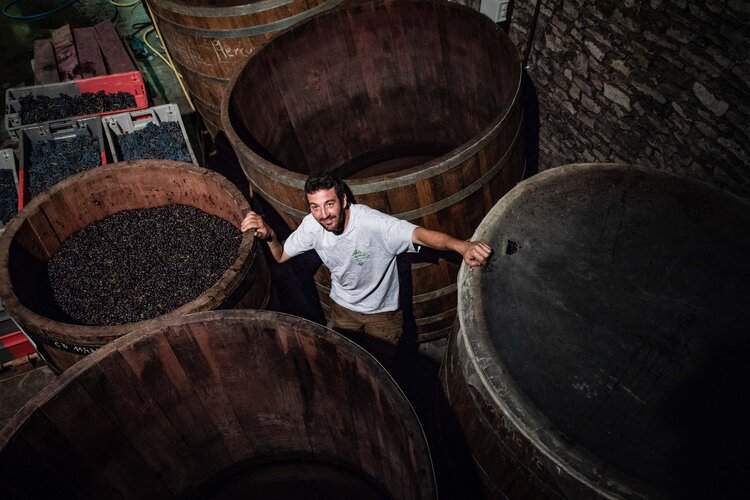Going Beyond Words
Posted by Connor Kennedy on December 30 2022 3:43pm
There are wine regions in the world so established and esteemed that writing about them has the danger of becoming redundant. Take Burgundy, France for example, home of arguably some of the best (and most expensive) wines in the world. There are a countless number of books, blogs, films, and magazine articles dedicated to this storied winemaking region, much of them waxing lyrical about the depth and ethereality of the wines. Much of it is deserved; there is nothing quite like a seriously crafted Burgundian wine, which offers a complexity even the most tested winetasters can struggle to articulate. To me, this is the essence of quality wine: despite the reams of words written about Burgundian wines, the best of them contain an ineffable quality that only proves the limitations of human language. The wine I had this week, Julien Altaber’s 2019 Premier Cru Monthélie “Sur la Velle”, was such a wine, eccentricities and all.
Burgundy can be a hard region to find your start in as a young and ambitious vigneron - land costs are enormous, and many winemakers there inherit vineyards and wineries from their families. Large Domaines can be staid and hew closely to traditions, even if those traditions include industrial agriculture and using copious amounts of sulfur. The most conservative of the bunch spurn those who dare to try something new, or break the mold in favor of more “natural” approaches to making wine. Yet Julien Altaber has dared to do it, and we’re all reaping the fruits of his labor. Altaber, who grew up on a dairy farm in Auvergne, first got his start working with Catherine and Dominique Derain of Domaine Derain, a leading natural winery in Burgundy. He learned from them all the basic principles of organic and biodynamic winemaking, which he now applies to his own wines. After being lent grapes and equipment from the Derains, Altaber began making his own cuvees and never looked back. He now owns a winery in the village of St. Aubin, along with a half hectare of his own grapevines.

Julien Altaber in the winery. Source: stevengraf.wine
I had the privilege of drinking Altaber’s Premier Cru Monthélie, meaning the Pinot Noir grapes were sourced from especially high quality vineyards around the village of Monthélie in the Côte de Beaune. Monthélie is known for producing more delicate red wines with expressive aromatics and soft yet firm tannins. There’s no doubt the “Sur la Velle” fits this description, even if the 2019 vintage is tasting especially fresh right now. The nose is effusive, showcasing Chelan cherries and other fruits like blackcurrants and blueberries. The palate is lush with the same qualities, with a uniquely wild acidity that leavens the fruit and integrates nicely into the wine’s gentle tannins. As it sits open, tertiary characteristics come forward, with the wine taking in wet-earth qualities that reminds the drinker that the beverage was once part of something planted in the ground. There was something to the wine that weaved its earthiness and fruitiness beautifully, though I lack the words to properly describe it. Maybe it’s better left a mystery.
As a young wine professional, there’s often a pressure to describe a wine “correctly”, as if there is some objective truth inside a glass of wine that we’re all just striving to find. Such pressures can come from various places, and, in their most excessive forms, can intimidate and push beginners away from the industry or even from drinking wine altogether. It’s a sorry thing, as wine is meant to be a delight rather than a source of anxiety. It’s the process of discovery that makes wine worth it, not regurgitating ossified conclusions about what a wine should or should not taste like. The very best wines I’ve had have left me truly speechless, and it's in that moment of silence that the analytical part of my mind retreats and I enjoy the wine best, in all its naked glory.

